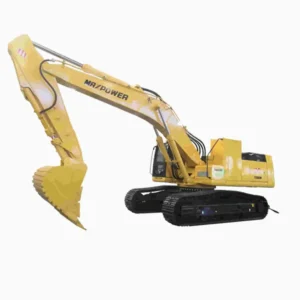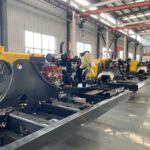Hydraulic Cylinder for Excavator:Hydraulic cylinders play a crucial role in the efficient operation of excavators. These powerful devices are essential components of the hydraulic system, providing the force necessary to perform various tasks, such as digging, lifting, and pushing heavy loads. In this article, we will explore the functionality, construction, maintenance, and benefits of hydraulic cylinders for excavators.
Outline
- Introduction
- Understanding Hydraulic Cylinders
- Types of Hydraulic Cylinders for Excavators
- Working Principles of Hydraulic Cylinders
- Benefits of Hydraulic Cylinders for Excavators
- Maintenance and Care 6.1 Regular Inspection
- Troubleshooting Common Issues
- Conclusion
- FAQs
Introduction

Excavators are heavy-duty machines used extensively in construction, mining, and other industries. These impressive pieces of equipment rely on hydraulic cylinders to perform their tasks effectively. Hydraulic cylinders are mechanical devices that convert hydraulic energy into linear force and motion. Let’s delve deeper into the functionality and construction of hydraulic cylinders for excavators.
Understanding Hydraulic Cylinders
Definition and Functionality
A hydraulic cylinder is a mechanical actuator that utilizes fluid power to generate force in a linear motion. In the case of excavators, hydraulic cylinders are responsible for executing various tasks, such as lifting heavy loads, moving the boom and bucket, and controlling the arm’s extension and retraction. They play a vital role in the overall performance and productivity of an excavator.
Components of a Hydraulic Cylinder
A typical hydraulic cylinder consists of several components, including a cylinder barrel, piston, piston rod, seals, and a hydraulic fluid reservoir. The cylinder barrel houses the piston and allows for smooth movement within it. The piston divides the cylinder into two chambers: the rod side and the cap side. Seals prevent fluid leakage and maintain the necessary pressure within the system. The hydraulic fluid reservoir stores the fluid needed for operation.
Types of Hydraulic Cylinders for Excavators
Single-Acting Hydraulic Cylinders
Single-acting hydraulic cylinders exert force in only one direction. They use hydraulic pressure to extend the piston, and an external force, such as gravity or a spring, retracts it. These cylinders are commonly found in applications where the load needs to be lifted or pushed in one direction, such as boom extensions or bucket tilting.
Double-Acting Hydraulic Cylinders
Double-acting hydraulic cylinders are more prevalent in excavators. They can exert force in both directions by using hydraulic pressure to extend and retract the piston. These cylinders offer greater control and versatility, enabling precise movement and operation of various excavator components.
Working Principles of Hydraulic Cylinders
Hydraulic Fluid and Pressure
Hydraulic cylinders rely on hydraulic fluid, usually oil, to transfer and amplify the force generated. The fluid is stored in the hydraulic system’s reservoir and directed to the cylinder when needed. By applying pressure to the fluid, force is exerted on the piston, which translates into linear motion.
Piston and Cylinder Operation
When hydraulic pressure is applied to the fluid, it pushes against the piston, causing it to move within the cylinder barrel. This movement generates force that is used to perform specific tasks, such as lifting heavy objects or moving excavator components. By controlling the flow of fluid into different chambers of the cylinder, operators can achieve precise and controlled movement.
Benefits of Hydraulic Cylinders for Excavators
Power and Efficiency
Hydraulic cylinders provide immense power to excavators, enabling them to handle heavy loads and perform demanding tasks with ease. They offer exceptional force output and efficiency, allowing operators to complete jobs quickly and effectively.
Precise Control
One of the significant advantages of hydraulic cylinders is their precise control over movement. Operators can make fine adjustments and maneuver excavator components with accuracy, ensuring optimal performance and minimizing errors.
Versatility and Adaptability
Hydraulic cylinders are highly versatile and adaptable to various excavator configurations and applications. They can be designed and installed to suit specific needs, providing customized solutions for different tasks and operating conditions.
Maintenance and Care

Maintenance and care are essential aspects when it comes to ensuring the longevity and reliable performance of hydraulic cylinders in excavators. By following proper maintenance practices, operators can prevent premature wear and damage, maximizing the efficiency and effectiveness of these crucial components.
Regular inspection of the hydraulic cylinders is paramount. This includes visually examining the cylinder barrel, piston, piston rod, seals, and other associated components. Look for any signs of leakage, corrosion, or physical damage. Identifying and addressing these issues early on can prevent further damage and costly repairs down the line.
Fluid level and quality should be monitored and maintained regularly. Check the hydraulic fluid reservoir and ensure that it is filled to the recommended level. Also, pay attention to the fluid’s condition, including its cleanliness and viscosity. Contaminated or degraded fluid can lead to reduced performance and increased wear on the cylinder components. Regular fluid analysis and scheduled fluid changes are essential to keep the hydraulic system in optimal condition.
Seals and gaskets play a critical role in preventing fluid leakage and maintaining the necessary pressure within the hydraulic system. Regularly inspect these components for wear, damage, or signs of deterioration. Replace any worn or damaged seals promptly to avoid potential leaks and maintain the integrity of the hydraulic system.
Additionally, lubrication is vital for the smooth operation of hydraulic cylinders. Follow the manufacturer’s recommendations regarding lubrication points and intervals. Ensure that the piston rod and other moving parts are properly lubricated to minimize friction and extend the lifespan of the cylinder.
Hydraulic Cylinder for Excavator:Troubleshooting Common Issues
Leakage Problems
Hydraulic cylinder leakage can occur due to worn seals or damaged components. It is important to identify and rectify the source of the leak to prevent system inefficiencies and potential safety hazards. Regular inspection and replacement of seals are necessary to maintain a leak-free hydraulic system.
Slow or Inconsistent Operation
If an excavator’s hydraulic cylinders exhibit slow or inconsistent operation, it could indicate problems with the fluid or internal components. Checking fluid levels, quality, and ensuring proper lubrication can help address these issues. If the problem persists, professional assistance should be sought to diagnose and fix the underlying cause.
Conclusion
Hydraulic cylinders are indispensable components of excavators, providing the force and control necessary to accomplish a wide range of tasks. Their power, precision, and adaptability contribute to the overall efficiency and performance of these impressive machines. By understanding their construction, working principles, and maintenance requirements, operators can ensure the longevity and optimal functioning of hydraulic cylinders in their excavators.
FAQs
- What is the purpose of a hydraulic cylinder in an excavator?
A hydraulic cylinder in an excavator is used to provide the force and motion required for various tasks, such as lifting heavy loads and moving excavator components. - What are the types of hydraulic cylinders for excavators?
The two main types of hydraulic cylinders for excavators are single-acting and double-acting cylinders. Single-acting cylinders exert force in one direction, while double-acting cylinders can exert force in both directions. - How do hydraulic cylinders work in excavators?
Hydraulic cylinders work by utilizing hydraulic fluid and pressure to exert force on a piston, which moves in a linear motion. This force is then used to perform specific tasks in an excavator. - What are the benefits of hydraulic cylinders for excavators?
Hydraulic cylinders provide power, precise control, and versatility to excavators. They enable efficient handling of heavy loads, precise movement of components, and adaptability to various operating conditions. - How should I maintain hydraulic cylinders in an excavator?
Regular inspection, checking fluid levels and quality, and addressing any signs of leakage or wear are crucial for maintaining hydraulic cylinders. Prompt maintenance and care ensure optimal performance and longevity.






-150x150.webp)
